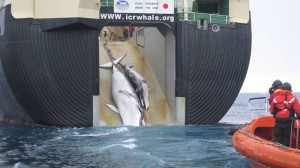Big Win Looms for Anti-Whaling Activists: Japan’s Whaling in the Antarctic Ocean Might Be Over
ANIMAL RIGHTS - VEGETARIANISM, 31 Mar 2014
Reid Singer - Outside Magazine

A Minke whale and her 1-year-old calf are dragged aboard the Nisshin Maru, a Japanese whaling vessel that is the world’s only factory ship. Photo: Customs and Border Protection/Wikimedia
This Monday, March 31 [2014], a ruling at The Hague on Japan’s whaling activity in the Antarctic Ocean might mark the end of an era. Although Japan has subsidized a robust whaling program since 1987—under the auspices of a research project, meant to discover whether commercial whaling is environmentally sustainable—critics outside of Japan have contended that the research project is a mere cover for allowing commercial whaling to continue, and for years, the project was condemned by environmental groups including Greenpeace, and by more radical groups such as Sea Shepherd Conservation Society (SSCS).
Sea Shepherd has attracted international attention for direct actions against Japanese whaling ships, including disabling whaling vessels at harbor, destruction of drift nets at sea, and nailing shut scuppers through which whale blood was released into the ocean. In 2007, Sea Shepherd was accused of causing fires that took place aboard the Nisshin Maru, Japan’s mother whaling ship. Last month, they, in turn, accused the Yushin Maru whaling ship of deliberately ramming one of their boats.
A 2007 New Yorker profile of Paul Watson, a founder of the SSCS, included a long list of national governments that denounce their activities at sea, in spite of widespread opposition to whaling in places like Australia. Preferring to voice their opposition by more conventional means, in 2010 Australia brought a suit against Japan at the International Court of Justice, arguing that the project violated a 1986 moratorium on commercial whaling by the International Whaling Commission. Should the court decide against Japan, it will more than likely mean an end to their ostensible research in the Antarctic Ocean.
The decision will come at an already strained moment for Japan’s whale market. The subsidy program supporting whaling research is in deep debt, and the Nisshin Maru, itself, is in dire need of repairs. To top this all off, the demand for whale meat in Japan is in noticeable decline, according to a report in the Associated Press. Apart from a few beach towns that practice small-scale whaling on their own, consumption is limited to school lunches, specialty restaurants, and the odd mariachi band.
Go to Original – outsideonline.com
DISCLAIMER: The statements, views and opinions expressed in pieces republished here are solely those of the authors and do not necessarily represent those of TMS. In accordance with title 17 U.S.C. section 107, this material is distributed without profit to those who have expressed a prior interest in receiving the included information for research and educational purposes. TMS has no affiliation whatsoever with the originator of this article nor is TMS endorsed or sponsored by the originator. “GO TO ORIGINAL” links are provided as a convenience to our readers and allow for verification of authenticity. However, as originating pages are often updated by their originating host sites, the versions posted may not match the versions our readers view when clicking the “GO TO ORIGINAL” links. This site contains copyrighted material the use of which has not always been specifically authorized by the copyright owner. We are making such material available in our efforts to advance understanding of environmental, political, human rights, economic, democracy, scientific, and social justice issues, etc. We believe this constitutes a ‘fair use’ of any such copyrighted material as provided for in section 107 of the US Copyright Law. In accordance with Title 17 U.S.C. Section 107, the material on this site is distributed without profit to those who have expressed a prior interest in receiving the included information for research and educational purposes. For more information go to: http://www.law.cornell.edu/uscode/17/107.shtml. If you wish to use copyrighted material from this site for purposes of your own that go beyond ‘fair use’, you must obtain permission from the copyright owner.
Read more
Click here to go to the current weekly digest or pick another article:
ANIMAL RIGHTS - VEGETARIANISM: